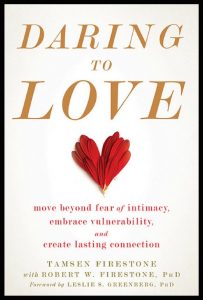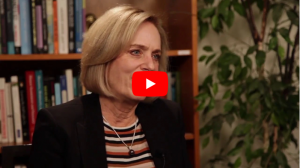How to Be Vulnerable to Love
 Being vulnerable is a popular topic of conversation these days. In fact, at this time, Brene Brown’s TED talk “The Power of Vulnerability” has had more than 30 million views. In spite of all the talk and of how much we may want to be vulnerable, especially in our romantic relationships, it’s not easy to drop our defenses and open ourselves up to another person.
Being vulnerable is a popular topic of conversation these days. In fact, at this time, Brene Brown’s TED talk “The Power of Vulnerability” has had more than 30 million views. In spite of all the talk and of how much we may want to be vulnerable, especially in our romantic relationships, it’s not easy to drop our defenses and open ourselves up to another person.
My book, Daring to Love, looks at the different reasons we push love away. One is that love makes us feel vulnerable, which then scares us. We often react by withdrawing into ourselves, or by withholding our loving behavior, or by trying to control our partner’s loving behavior. All to defend against feeling vulnerable.
Obviously we can strive to control our defensive reaction. We can resist isolating ourselves, we can interrupt our withholding behavior, and we can stop trying to control our partner. But there are also behaviors that we can engage in that will help us be more vulnerable: being generous, asking for what you want, and expressing and accepting affection. The following is excerpted from Daring to Love.
BE GENEROUS
Being generous—that is, giving freely of yourself, your time, and your energy—kindles vulnerability. Generosity is an outward expression of sensitivity and compassion of your partner. The empathy and understanding that are fundamental to being truly generous also sustain the vulnerability of both the giver and the receiver. When an act of generosity grows out of this type of attunement to and appreciation of your partner’s uniqueness, it gratifies both of you.
Generosity is also effective in counteracting your withholding behavior. When you extend consideration and kindness in response to your partner’s needs, as an expression of compassion and empathy, you interrupt the withholding pattern that restricts emotional exchanges between you. Therefore, it is advisable to make an effort to be giving in situations where you would normally withhold. It is also important to be generous without any expectation of reciprocal treatment. If your actions are designed to create an obligation, garner favor, or maintain a superior position, then they are not truly generous and will ultimately be hurtful to you and your partner.
Acts of generosity can take many forms. Money and other material gifts are the most easily measurable forms, but they can have less emotional and psychological impact than other types of generosity. Generous people actively look for opportunities to respond to a need in friends and loved ones. Generosity is expressed by the willingness to drop anything to do a favor or lend a hand. It can be as simple as listening when someone needs to talk.
In a close relationship, acts of generosity involve an equal exchange between partners, with benevolence on one side and receptiveness on the other. By this definition, receiving is also a generous action—it is an act of love to graciously accept and appreciate affection, kind deeds, or assistance.
Being generous with your words, your time, and your affection is not just an antidote to withholding behavior. It can also help you overcome a negative self-image as well as a cynical, distrustful attitude toward others. Altruistic actions increase feelings of self-esteem and make us feel worthwhile.
Giving to others tends to leave us feeling liberated, energized, and less defended. We also feel more satisfied in our relationships. Aside from being a moral way to live, being generous and giving is essential to our emotional well-being.
ASK FOR WHAT YOU WANT
Asking for what you want helps you be vulnerable. It challenges your self-protective defense of being isolated because it forces you to turn to someone else to gratify your needs. It disrupts the self-indulgent habits that thrive in isolation and [the attitude that you can take care of yourself; that you don’t need anything from anyone else.]
Asking for what you want is difficult for many people because feelings of shame often accompany wanting or needing something from another person. Shame is a painful, primitive emotion that originates in early childhood from incidents when basic needs were not fulfilled. These incidents leave children feeling deeply ashamed of their desire for affection and for wanting to be touched, loved, seen, and understood. To avoid the humiliation of ever again feeling unloved or being seen as unlovable, children become desperate to cover up any signs of wanting, and as adults they continue to expect humiliation and shaming if they ask for what they want.
In your relationship, you cannot be vulnerable unless you are willing to overcome your resistance to asking directly for what you want. Making a direct request for what you want allows your partner to know you and know what to offer you. Being vulnerable involves being willing to risk rejection, disappointment, or frustration. And there’s a valuable lesson to be learned from asking directly for what you want: it’s that, as an adult, you can tolerate being disappointed or frustrated when a request is declined. Asking directly for what you want will make you stronger as you become increasingly aware that you are no longer that helpless child who once suffered shame and humiliation.
Another benefit of being aware of what you want is that when you know what you want and have a feeling for what you need, you know who you are. Without awareness of your basic wants and needs, you have no way of knowing what is important or meaningful to you, and therefore no way of guiding your life. Knowing what you want is fundamental to realizing yourself as an individual, and asking for what you want is crucial to maintaining your vulnerability in your relationship.
EXPRESS AND ACCEPT AFFECTION
When you offer and accept affection in your intimate relationship, you encourage your vulnerability and discourage your controlling defenses. As both you and your partner participate in the mutual give-and-take of loving exchanges, neither of you is likely to exert control over the other. When you are freely giving, and when you are receptive to affection that is tender, caring, playful, and seductive, you are open and undefended with your partner. Affection, both verbal and physical, is an outward expression of generosity and a reflection of asking for needs and desires to be fulfilled.
When you first initiate these constructive behaviors, you will probably feel anxious and uncomfortable. You may feel like a fool. You may want to protect yourself. You may feel like you are putting yourself in a position to be hurt or taken advantage of. But if you are steadfast in your resolve and maintain your plan of action, your anxiety and doubts will subside, and you will begin to reap the benefits of being vulnerable to love.
Reprinted with permission: New Harbinger Publications, Inc.
Copyright © 2018 [Tamsen Firestone]
 Daring to Love
Daring to Love
Move Beyond Fear of Intimacy, Embrace Vulnerability, and Create Lasting Connection









A short time before our marriage my wife started pulling away emotionally, sexually and physically into a fantasy marriage. She has issues from her childhood, molested, father abandonment, a controlling sister
mother emotionally and lovingly not present…
We have read most firestone books and listened to podcast from psychalive seeking some resolve but nothing sticks to her, she gets it and forgets it.
I love her and have worked hard in find new ways to give her tools to correct her confidence in herself
Her withdrawal into herself is like watching everything they a glass window not actively involved and if she encounters a depression or something upsets her she has an egg shell to withdrawal into
Do you know of any group theraphy for married couples we could attend, we love to work with Lisa Firestone but we are not able to do a $200.00 per visit